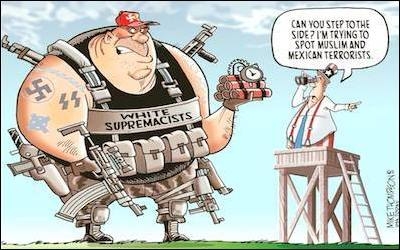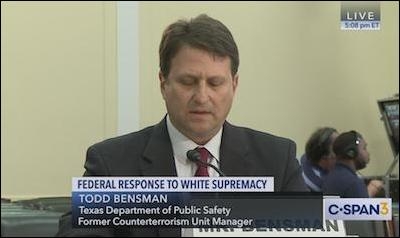by Todd Bensman
Unlike white supremacism, violent Islamism emanates from a global set of actors and ideologies.

In the aftermath of this past weekend's mass shootings, [a new form of an old] narrative is finding purchase: that strong post-9/11 efforts to counter Islamist terrorism are politically and racially inequitable compared to the weak, suppressed efforts to counter violent white nationalism.
As the editorial board of The New York Times put it Sunday, "There are serious questions about how the United States has approached Islamic extremism, but if even a degree of that vigilance and unity of effort was put toward white nationalism, we'd be safer."
Assessments like this belie a surprising ignorance of the fact that homeland security legislation, appropriations, and response were structured after 9/11 to address problem sets that are so mutually exclusive that they have and always will require separate approaches. This is the very definition of a false comparison that should stand corrected as the nation lurches forward in any public discussion. It cannot be farther from true that violent Islam received a disproportionate attention at the high cost of allowing domestic forms of violent extremism to flourish.
Unlike white supremacism, violent Islamism emanates from a global set of actors and ideologies.
|
Consider what it might take to counter al-Qaeda plans to send operatives from Afghan training camps to hijack planes in America, or to disrupt ISIS operatives moving across multiple borders on mass-casualty attack missions in Europe, or to counter the highly effective online recruitment of Americans who travel abroad and join foreign groups of killers in foreign countries with plans to return home, perhaps indoctrinated to commit acts of terror. Legislation and vast inter-agency intelligence-sharing reforms after 9/11 were necessary to marry this very unique American response to an equally unique threat.
White supremacy is largely a law enforcement problem confined to the United States.
|
Much has been said, for instance, about the online format "8chan" as a platform for spreading incitements to violence among white racist extremists (the site has been closed since El Paso). But law enforcement agencies already have the means to watch sites like this, and other sites that traffic in narcotics and stolen property, for that tricky moment when free speech becomes illegal incitement or provides probable cause indicators.
Lone offender racists in the United States are not deployed from places abroad that must be controlled and monitored as with international jihadist terrorism. For that reason, domestic terrorism plots require an almost exclusively domestic law enforcement response by the FBI, local sheriff's offices, and state police agencies like the one I used to work for in Texas.

Todd Bensman testifies before a U.S. House subcommittee on FBI efforts to combat white supremacy on June 4, 2019.
|
But not much new legislation, such as a standalone Domestic Terrorism Statute, was ever necessary to mount a counterattack on violent white nationalism, since all of the necessary component parts—cops, prosecutors, and criminal statutes that carry high punishments, such as for murder and hate crimes—have long been in place.
Critics of President Trump may feel a strong compulsion to argue that his excess hatred of Islam and affection for white supremacy drove policy toward a break for the white nationalists. But their thinking is flawed by gaps in basic knowledge of how homeland security is structured to deal with both problems in the unique ways that are necessary.
This is not to say that American law enforcement can't pivot to meet a growing threat with greater resources and attention. As I testified to Congress in June, "The number of racially motivated criminal events is now higher than what we were used to. A pivot is necessary to reverse the trend."
However, inequality of effort certainly did not contribute to El Paso. Self-propelled lone offenders who use simple tactics in their attacks are notoriously difficult for law enforcement to detect, or to detect in time to lawfully intervene.
The FBI has tallied hundreds of prosecutions related to the Islamist terror threat.
|
To divert from efforts to disrupt Islamist attacks by the hundreds no doubt will result in lost lives one day, as it did before 9/11. In any case, whether to prioritize violent Islamism or white nationalism is not an either-or proposition. This is a resourced country that certainly can and should do both jobs separately and well.
Todd Bensman is a fellow at the Middle East Forum and a senior national security fellow for the Center for Immigration Studies. Bensman previously led counterterrorism-related intelligence efforts for the Texas Intelligence and Counterterrorism Division (ICD) for nearly a decade.
Source: https://www.meforum.org/59106/counterterrorism-fight-against-white-supremacy
Follow Middle East and Terrorism on Twitter
No comments:
Post a Comment